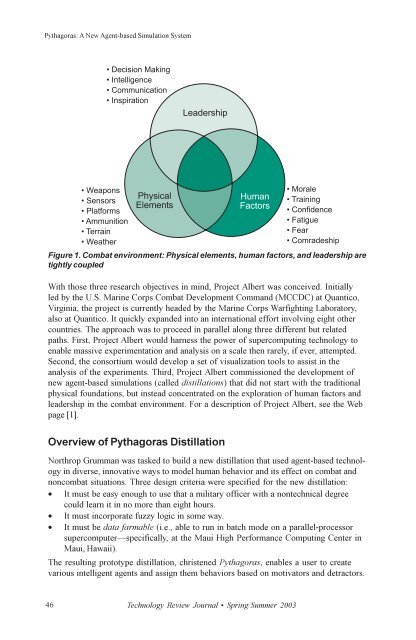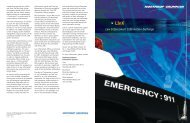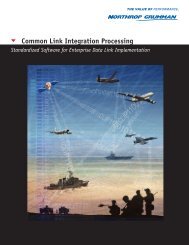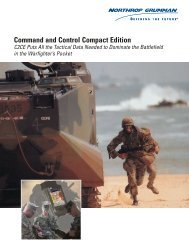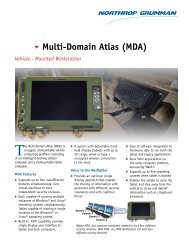Pythagoras: A New Agent-based Simulation System - Northrop ...
Pythagoras: A New Agent-based Simulation System - Northrop ...
Pythagoras: A New Agent-based Simulation System - Northrop ...
Create successful ePaper yourself
Turn your PDF publications into a flip-book with our unique Google optimized e-Paper software.
<strong>Pythagoras</strong>: A <strong>New</strong> <strong>Agent</strong>-<strong>based</strong> <strong>Simulation</strong> <strong>System</strong><br />
Figure 1. Combat environment: Physical elements, human factors, and leadership are<br />
tightly coupled<br />
With those three research objectives in mind, Project Albert was conceived. Initially<br />
led by the U.S. Marine Corps Combat Development Command (MCCDC) at Quantico,<br />
Virginia, the project is currently headed by the Marine Corps Warfighting Laboratory,<br />
also at Quantico. It quickly expanded into an international effort involving eight other<br />
countries. The approach was to proceed in parallel along three different but related<br />
paths. First, Project Albert would harness the power of supercomputing technology to<br />
enable massive experimentation and analysis on a scale then rarely, if ever, attempted.<br />
Second, the consortium would develop a set of visualization tools to assist in the<br />
analysis of the experiments. Third, Project Albert commissioned the development of<br />
new agent-<strong>based</strong> simulations (called distillations) that did not start with the traditional<br />
physical foundations, but instead concentrated on the exploration of human factors and<br />
leadership in the combat environment. For a description of Project Albert, see the Web<br />
page [1].<br />
Overview of <strong>Pythagoras</strong> Distillation<br />
<strong>Northrop</strong> Grumman was tasked to build a new distillation that used agent-<strong>based</strong> technology<br />
in diverse, innovative ways to model human behavior and its effect on combat and<br />
noncombat situations. Three design criteria were specified for the new distillation:<br />
• It must be easy enough to use that a military officer with a nontechnical degree<br />
could learn it in no more than eight hours.<br />
• It must incorporate fuzzy logic in some way.<br />
• It must be data farmable (i.e., able to run in batch mode on a parallel-processor<br />
supercomputer—specifically, at the Maui High Performance Computing Center in<br />
Maui, Hawaii).<br />
The resulting prototype distillation, christened <strong>Pythagoras</strong>, enables a user to create<br />
various intelligent agents and assign them behaviors <strong>based</strong> on motivators and detractors.<br />
46<br />
Weapons<br />
Sensors<br />
Platforms<br />
Ammunition<br />
Terrain<br />
Weather<br />
• Decision Making<br />
Intelligence<br />
Communication<br />
Inspiration<br />
Physical<br />
Elements<br />
Leadership<br />
Human<br />
Factors<br />
Technology Review Journal • Spring/Summer 2003<br />
Morale<br />
Training<br />
Confidence<br />
Fatigue<br />
Fear<br />
Comradeship


